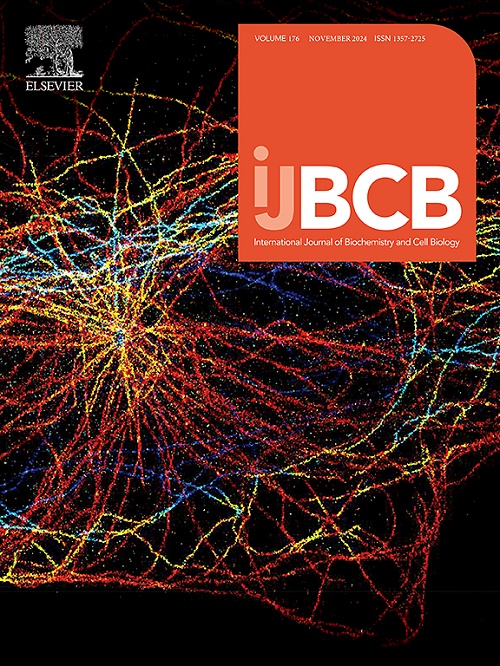长时间的谷氨酰胺饥饿会重新激活 mTOR,从而抑制自噬并启动自噬溶酶体重组,以维持细胞活力。
IF 2.8
3区 生物学
Q2 BIOCHEMISTRY & MOLECULAR BIOLOGY
International Journal of Biochemistry & Cell Biology
Pub Date : 2024-11-14
DOI:10.1016/j.biocel.2024.106694
引用次数: 0
摘要
自噬是一种细胞回收机制,利用溶酶体进行细胞降解。长时间的自噬会减少细胞中功能性溶酶体的数量。然而,在自噬的最后阶段(即自噬溶酶体重组(ALR)),功能性溶酶体会再生,从而维持溶酶体的平衡。通过共聚焦显微镜观察谷氨酰胺饥饿过程,我们揭示了自溶酶体小管的再生是通过显著的膜重塑实现的,这主要依赖于mTOR的重新激活、RAB7的解离、磷脂酰肌醇3磷酸酯(PI3P)依赖性达纳敏2和凝集素的招募。在谷氨酰胺缺乏的细胞中,我们发现mTOR是调节ALR启动的核心调节因子,用雷帕霉素对其进行药理抑制会导致溶酶体管化减少。此外,RAB7和Clathrin对小管的伸长至关重要,而针对RAB7和Clathrin的siRNA可限制谷氨酰胺饥饿条件下小管的启动。在这种情况下,我们研究了谷氨酰胺长期缺乏时ALR的生理相关性,发现基因和药物抑制参与ALR的关键蛋白可促进口腔癌细胞的死亡,从而确定了ALR在应激过程中对维持细胞存活至关重要。本文章由计算机程序翻译,如有差异,请以英文原文为准。
Prolonged glutamine starvation reactivates mTOR to inhibit autophagy and initiate autophagic lysosome reformation to maintain cell viability
Autophagy, a cellular recycling mechanism, utilizes lysosomes for cellular degradation. Prolonged autophagy reduces the pool of functional lysosomes in the cell. However, lysosomal homeostasis is maintained through the regeneration of functional lysosomes during the terminal stage of autophagy, i.e. Autophagic lysosome reformation (ALR). Through confocal microscopy during glutamine starvation, we unravel the regeneration of tubules from autolysosomes by undertaking significant membrane remodeling, which majorly depends on mTOR reactivation, RAB7 dissociation, phosphatidyl inositol 3 phosphate (PI3P) dependent-dynamin 2 and clathrin recruitment. In glutamine-starved cells, we found mTOR is the central modulator in regulating ALR initiation, and its pharmacological inhibition with rapamycin leads to a decrease in lysosomal tubulation. Moreover, RAB7 and Clathrin are essential for tubule elongation and it showed that siRNA targeting RAB7 and Clathrin restricts tubule initiation under glutamine starvation. In this setting, we examined the physiological relevance of ALR during prolonged glutamine deprivation and found that genetic and pharmacological inhibition of critical proteins involved in ALR promotes cell death in oral cancer cells, establishing ALR is essential for maintaining cell survival during stress.
求助全文
通过发布文献求助,成功后即可免费获取论文全文。
去求助
来源期刊
CiteScore
8.10
自引率
0.00%
发文量
124
审稿时长
19 days
期刊介绍:
IJBCB publishes original research articles, invited reviews and in-focus articles in all areas of cell and molecular biology and biomedical research.
Topics of interest include, but are not limited to:
-Mechanistic studies of cells, cell organelles, sub-cellular molecular pathways and metabolism
-Novel insights into disease pathogenesis
-Nanotechnology with implication to biological and medical processes
-Genomics and bioinformatics

 求助内容:
求助内容: 应助结果提醒方式:
应助结果提醒方式:


